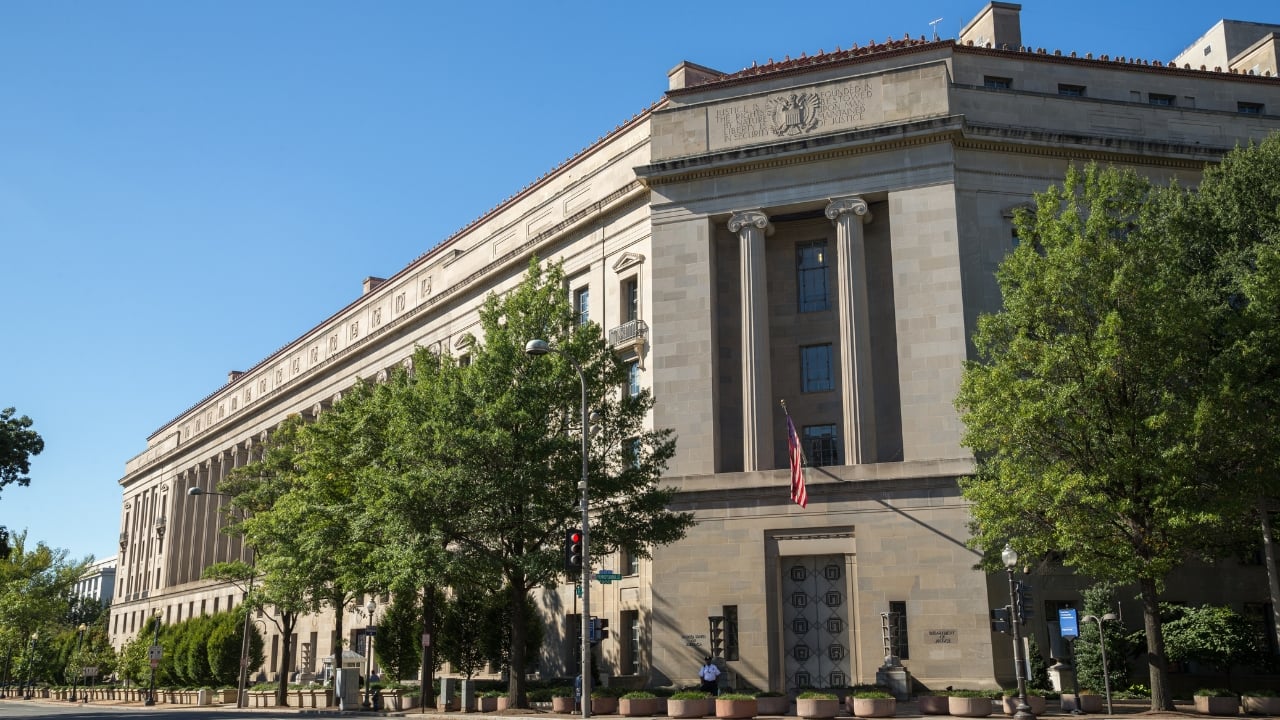Picture a scenario where a national government agency steals your legal management software to illegally traffic weapons and class-A drugs. This is exactly what happened to the software development company Inslaw in 1986 in a scandal that has become known as the Inslaw Affair.
For years, the case has captivated those who have examined every detail or followed the mysterious fate of investigative journalist Danny Casolaro, who met his tragic end shortly after investigating its depths. But what really happened in the Inslaw case, and why does it continue to enthral the public years after the original scandal?
In this article, we’ll examine the case, shedding light on the allegations of government misconduct using PROMIS and the Octopus conspiracy theory.

What is Inslaw?
Inslaw, Inc. is a software company that gained significant attention in the 1980s due to its legal battles with the United States (US) government.
The company developed a case management software named PROMIS, which was initially designed to manage US caseloads efficiently.
Originally funded by a government grant in the 1970s, the development of PROMIS brought it into the public domain, making it free for use. Edwin Meese, a notable figure of the time, expressed great enthusiasm for PROMIS, which was advertised as revolutionary for law enforcement.
This sentiment culminated in a substantial contract worth $9.6 million awarded to Inslaw by the US Department of Justice (DOJ) in March 1982.
The goal? To implement the public domain version of PROMIS in select US Attorney's offices as a pilot programme, with the potential for expansion to federal prosecutors' offices nationwide.
History PROMIS Software
PROMIS, an acronym for Prosecutor's Management Information System, revolutionised legal case management with its comprehensive suite of tools developed by Inslaw.
The software emerged as a legal game-changer, providing prosecutors and law enforcement agencies with a powerful toolset to streamline case management.
While PROMIS was not the first database management system ever created, it represented a significant advancement in the field, particularly within the legal domain.

The software stood out for its specific focus on case management and its advanced capabilities tailored to the needs of prosecutors and legal professionals.
It introduced innovative features for its time, such as the ability to track legal proceedings, manage caseloads, and facilitate information sharing within legal departments. It also offered sophisticated document management functionalities, empowering users to organise, store, and retrieve case-related documents easily.
At its core, PROMIS provided a centralised repository for critical information, facilitating collaboration and information sharing among teams from initiation to resolution.

When Tech Giants Lose Focus
How leadership churn, portal-era bets and misjudged deals eroded Yahoo’s position in search, media and digital advertising.
What is the Inslaw Affair?
The narrative surrounding PROMIS took a controversial turn when Inslaw accused the DOJ of illegally modifying the software.
Allegations suggested that the DOJ had implemented unauthorised changes, including backdoor functionalities, enabling covert surveillance and intelligence gathering.
According to Inslaw, the DOJ had unlawfully altered the software and disseminated it to numerous government entities and foreign intelligence agencies without authorisation.Such allegations sparked a lengthy legal battle between the company and the DOJ, which denied any wrongdoing.
However, investigations and subsequent court proceedings unearthed evidence supporting Inslaw's claims, including testimonies from former DOJ employees.

Despite years of litigation, a conclusive resolution to the case remains elusive, leaving questions about accountability and transparency within the highest levels of government.
The case remains controversial and is often cited as an example of government misconduct and the challenges faced by small companies when dealing with powerful government entities.
Inside a Social Graph Collapse
A case study in weak mobile-era adaptation, algorithm shifts, and feature deprecation eroding network effects in visual platforms.

How did the case become famous?
The Inslaw Affair gained widespread attention in the 1980s and early 1990s. However, it was investigative journalist Danny Casolaro's deep dive into the case that propelled it into the spotlight of public scrutiny.
Casolaro's investigative focus centred on a theory proposing a nexus between disparate events such as the Inslaw case, the Iran-Contra arms deal, the October Surprise, the B.C.C.I. scandal, and even historical incidents like Watergate and the Bay of Pigs Invasion.
Casolaro believed that the PROMIS software was a keystone in a sprawling network of scandals, which he famously dubbed "The Octopus Conspiracy".
As Casolaro conducted interviews, gathered evidence, and pieced together a narrative of government malfeasance, his investigation garnered significant attention. His efforts to uncover the truth behind the alleged misuse of PROMIS and its connection to broader corruption scandals captured the public and the media's imagination.
What are the Octopus Murders?
The Octopus Murders gained widespread attention after Netflix released the true crime docu-series "American Conspiracy: The Octopus Murders".
This gripping series dives into Journalist Danny Casolaro's investigation into the Inslaw Conspiracy, a web of alleged government corruption, covert operations, and corporate espionage, famously referred to as the "Octopus".
Casolaro's death in a hotel room, under suspicious circumstances, remains a focal point in the series. While his investigation into the conspiracy involved claims against the US government, there has never been sufficient evidence to unravel the truth.
Released in February, the docu-series has sparked renewed interest in Casolaro's work, with viewers and conspiracy theorists searching for more information on the Octopus Murders and its connections to the Inslaw Affair.
With an 83% positive rating from critical on Rotten Tomatoes, the show has captivated audiences, leaving many wondering if the Octopus Conspiracy was based on a true story or remains a dark, unresolved mystery.

Ransomware Tests US Cyber Armor
The MOVEit campaign highlights how opportunistic gangs can still pierce federal defenses and disrupt critical national infrastructure.
As curiosity around Danny Casolaro's death grows, the question of what really happened in the Octopus Murders continues to intrigue true crime enthusiasts and conspiracy theorists alike.
What happened to Danny Casolaro?
Casolaro's investigation was tragically cut short when he was found dead in a West Virginia hotel room in 1991. Casolaro's death was ruled a suicide, but many, including his family, have questioned this conclusion, given the nature of his investigation and the threats he received before his death.
Despite this verdict, numerous unanswered questions and inconsistencies surrounding his death have fuelled speculation and alternative theories, with some suggesting foul play and a cover-up orchestrated by powerful forces implicated in his investigation. In other words, many believe that those involved in the Octopus are the ones to blame for his death.
The mysterious circumstances of Danny Casolaro's demise continue to captivate curiosity and intrigue, leaving many to wonder what secrets he may have unearthed and who may have been responsible for silencing his investigation.
Who is Michael James Riconosciuto?
A former scientist and computer expert, Riconosciuto gained attention after claiming that he modified the PROMIS software at the request of the US government for covert surveillance purposes.
His alleged involvement in this case, alongside Danny Casolaro's investigation into government corruption, has made him a central figure in these conspiracies.
Riconosciuto's claims have sparked widespread intrigue, but his credibility remains in question due to his criminal record and subsequent legal troubles.
Despite this, he continues to be a key player in discussions surrounding the Octopus Conspiracy, with many conspiracy theorists considering him an insider with deep knowledge of covert government operations.
His connection to the Inslaw Affair and his role in modifying PROMIS software remain subjects of interest for those researching government scandals and unsolved mysteries.
When Breach Containment Fails
What a 560m-record heist exposes about outdated perimeter defenses and why boards must pivot to an assume-breach, limit-and-contain security model.

What is the Octopus Conspiracy?
Dubbed "The Octopus" by Casolaro, it was allegedly a vast, interconnected network of government agencies, intelligence operatives, organised crime syndicates, and powerful individuals operating clandestinely to manipulate global events and further their own agendas.
The PROMIS software scandal was at the centre of the Octopus conspiracy. According to his theory, PROMIS served as a central tool for the Octopus, enabling the covert monitoring of individuals, financial transactions, and other sensitive information on a global scale.
Casolaro believed that the Octopus utilised PROMIS to facilitate a wide range of illicit activities, including arms trafficking, drug smuggling, money laundering, and political manipulation.
Despite the controversy surrounding the Octopus conspiracy theory and Casolaro's untimely death, his work continues to fascinate researchers, conspiracy theorists, and journalists interested in uncovering the hidden mechanisms of power and influence in society.
The Octopus remains a symbol of the complex web of secrecy and intrigue that exists within the corridors of power, prompting ongoing scrutiny and speculation into the nature of government operations and covert activities.







Comments ( 1 )
David Argent
14/11/2024